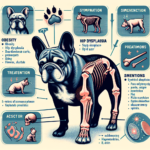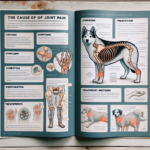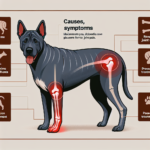French Bulldog Joint Pain: Causes, Symptoms, Prevention, and Treatment

Introduction
Overview of French Bulldog: The French Bulldog, affectionately known as the “Frenchie,” is a small domestic breed that originated in France in the 19th century. Known for their bat-like ears, compact size, and affectionate nature, French Bulldogs have become one of the most popular companion dogs worldwide. They were initially bred as a toy version of the English Bulldog and quickly gained popularity among lace workers in Nottingham, England, before making their way to France. Frenchies are characterized by their muscular build, short coat, and distinctive “smushed” face, which gives them a unique and endearing appearance.
General Health Concerns: While French Bulldogs are generally healthy, they are prone to several health issues due to their unique physical characteristics. Common concerns include brachycephalic syndrome, which affects their breathing, skin allergies, and spinal disorders. Among these, joint pain is a significant issue that can severely impact their quality of life.
Importance of Joint Health in French Bulldogs: Joint health is crucial for French Bulldogs due to their compact and muscular build. Poor joint health can lead to pain, reduced mobility, and a lower quality of life. Given their predisposition to certain joint issues, maintaining optimal joint health is essential for ensuring that French Bulldogs live happy, active lives.
Breed-Specific Joint Pain Risks
Genetic Predisposition
French Bulldogs are genetically predisposed to several joint-related issues. One of the most common is hip dysplasia, a condition where the hip joint doesn’t fit into the hip socket properly, leading to pain and arthritis over time. Another concern is elbow dysplasia, which involves abnormal development of the elbow joint. Additionally, French Bulldogs are prone to patellar luxation, where the kneecap dislocates from its normal position.
Age-Related Risks
As French Bulldogs age, the risk of joint pain increases. Degenerative joint diseases like osteoarthritis become more common in older dogs. Typically, signs of joint pain may start to appear around the age of 5-6 years, but this can vary depending on the individual dog’s health and lifestyle. Early detection and management are crucial for mitigating the impact of age-related joint issues.
Activity Level and Joint Stress
French Bulldogs are not as high-energy as some other breeds, but they still require regular exercise to maintain their health. However, their compact build and muscular frame can put additional stress on their joints, especially if they engage in high-impact activities. Activities like jumping or running on hard surfaces can exacerbate joint stress, leading to pain and potential injury.
Common Symptoms of Joint Pain in French Bulldogs
General Symptoms
Owners should be vigilant for common symptoms of joint pain, which include:
- Limping: A noticeable limp or favoring one leg over another.
- Stiffness: Difficulty in getting up or lying down, especially after rest.
- Reluctance to Move: Hesitation or refusal to engage in physical activities they once enjoyed.
- Swelling: Visible swelling around the joints.
- Behavioral Changes: Increased irritability or signs of discomfort when touched.
Breed-Specific Symptoms
In French Bulldogs, joint pain may also manifest as:
- Hunched Back: A hunched posture due to discomfort in the spine or hips.
- Dragging Paws: Difficulty lifting their paws properly, leading to dragging.
- Reduced Muscle Mass: Muscle atrophy around the affected joints due to decreased activity.
When to Consult a Vet
If you notice any of the above symptoms, it’s essential to consult a veterinarian promptly. Early intervention can prevent further deterioration and improve your dog’s quality of life. Persistent symptoms, sudden changes in behavior, or severe pain should be addressed immediately.
Preventive Measures for Joint Health
Exercise Recommendations
Regular, low-impact exercise is crucial for maintaining joint health in French Bulldogs. Activities such as:
- Short Walks: Multiple short walks throughout the day rather than one long walk.
- Swimming: A great low-impact exercise that strengthens muscles without stressing the joints.
- Gentle Play: Interactive play that avoids high-impact activities like jumping.
Dietary Suggestions
A balanced diet rich in joint-supporting nutrients can significantly benefit French Bulldogs. Consider incorporating:
- Glucosamine and Chondroitin: Supplements that support cartilage health.
- Omega-3 Fatty Acids: Found in fish oil, these reduce inflammation and support joint health.
- Antioxidants: Foods rich in antioxidants, like blueberries and spinach, can reduce inflammation.
Weight Management
Maintaining a healthy weight is crucial for reducing joint stress. Overweight French Bulldogs are at a higher risk of developing joint issues. Follow these guidelines:
- Regular Weigh-Ins: Monitor your dog’s weight regularly to ensure they stay within a healthy range.
- Portion Control: Feed appropriate portions based on your dog’s age, weight, and activity level.
- Healthy Treats: Opt for low-calorie treats and avoid overfeeding.
Early Screening and Monitoring
Early detection of joint issues can make a significant difference. Consider:
- Regular Vet Check-Ups: Schedule routine veterinary visits for early screening.
- Joint Health Assessments: Ask your vet about specific tests to assess joint health, such as X-rays or physical exams.
- Monitoring Activity Levels: Keep an eye on any changes in your dog’s activity or behavior that may indicate joint pain.
Treatment Options for Joint Pain
Non-Surgical Treatments
For mild to moderate joint pain, non-surgical treatments can be effective:
- Medications: Anti-inflammatory drugs and pain relievers prescribed by a vet.
- Physical Therapy: Exercises and treatments designed to improve joint function and reduce pain.
- Lifestyle Adjustments: Modifying activities to reduce joint stress and incorporating joint-friendly exercises.
Surgical Options
In severe cases, surgical intervention may be necessary. Common surgeries include:
- Hip Replacement: Replacing a damaged hip joint with an artificial one.
- Arthroscopy: A minimally invasive procedure to clean out the joint.
- Osteotomy: Cutting and realigning bones to improve joint function.
Alternative Therapies
Alternative treatments can complement traditional methods and provide additional relief:
- Acupuncture: Using needles to stimulate specific points and reduce pain.
- Hydrotherapy: Water-based exercises that reduce joint stress while improving strength.
- Massage: Therapeutic massage to relieve muscle tension and improve circulation.
Lifestyle and Management Tips
Daily Care Routine
A consistent daily care routine can help manage joint pain:
- Morning Walk: A short, gentle walk to start the day.
- Joint Supplements: Administer any prescribed supplements with breakfast.
- Midday Play: Gentle play or a swim session to keep muscles active.
- Evening Massage: A gentle massage to relax muscles and reduce stiffness.
Modifying the Home Environment
Making your home more joint-friendly can significantly improve your dog’s comfort:
- Ramps: Install ramps to help your dog navigate stairs or get onto furniture.
- Orthopedic Beds: Provide supportive bedding to reduce pressure on joints.
- Non-Slip Flooring: Use rugs or mats to prevent slipping on hard floors.
Long-Term Management
Long-term strategies are essential for managing chronic joint pain:
- Regular Vet Visits: Keep up with routine check-ups to monitor joint health.
- Consistent Exercise: Maintain a regular, low-impact exercise routine.
- Ongoing Weight Management: Continue to monitor and manage your dog’s weight.
FAQs About French Bulldogs and Joint Pain
What are the early signs of joint pain in French Bulldogs?
Early signs include limping, stiffness, reluctance to move, and behavioral changes such as irritability or discomfort when touched.
Can joint pain in French Bulldogs be prevented?
While genetic predispositions can’t be entirely prevented, maintaining a healthy weight, providing a balanced diet, and ensuring regular, low-impact exercise can significantly reduce the risk.
Are there specific foods that can help with joint health?
Yes, foods rich in glucosamine, chondroitin, omega-3 fatty acids, and antioxidants can support joint health. Supplements can also be beneficial.
When should I consult a vet about my French Bulldog’s joint pain?
If you notice persistent symptoms such as limping, stiffness, or reluctance to move, it’s essential to consult a vet. Sudden changes in behavior or severe pain should be addressed immediately.
What are the best exercises for a French Bulldog with joint pain?
Low-impact exercises like short walks, swimming, and gentle play are ideal for maintaining joint health without causing additional stress.
Conclusion
Joint pain is a significant concern for French Bulldogs, but with proper care and attention, it can be managed effectively. By understanding the causes, symptoms, and preventive measures, owners can take proactive steps to ensure their French Bulldogs lead happy, active lives. Regular veterinary consultations, a balanced diet, appropriate exercise, and a supportive home environment are key to maintaining optimal joint health. Remember, early detection and intervention are crucial, so always be vigilant and consult your veterinarian at the first sign of joint pain.



